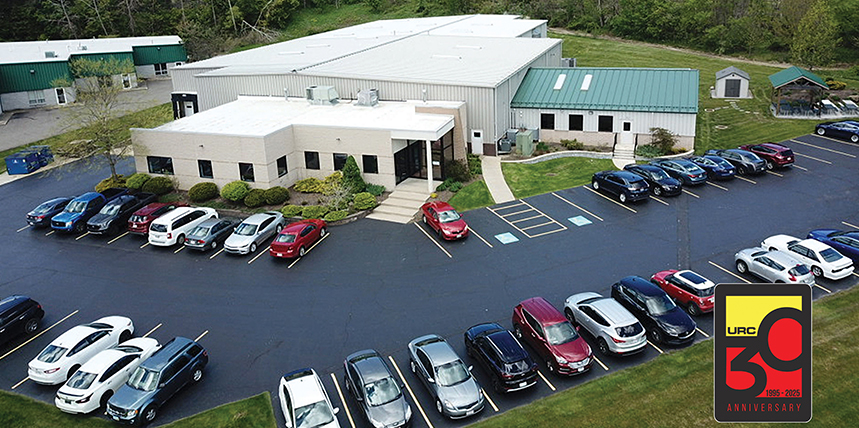
NETA Corporate Alliance Partners (CAPs) are industry-leading companies that have joined forces with NETA to work together toward a common aim: improving quality, safety, and electrical system reliability.
In this ongoing NETA World series, we focus on the thought leadership behind these successful companies. This issue’s CAP Spotlight features an interview with Brian Bianchi, Director of Sales and Marketing at Utility Relay Company (URC), makers of AC-PRO® circuit breaker modernization kits and accessories. He brings over 20 years of experience in the electrical industry, having worked across engineering, operations, and commercial disciplines. Brian holds an MS in electrical engineering from Cleveland State University and an MBA from Grove City College. Brian’s well-rounded background contributes to URC’s ability to help companies modernize their electrical systems in ways that maximize uptime and drive operational excellence.
NW: What recent company milestone or achievement are you particularly proud of?
Bianchi: Utility Relay Company (URC) is celebrating its 30th anniversary this year, marking three decades of innovation, growth, and commitment to the electrical industry. What began in 1995 as a small startup operating out of a basement has evolved into a leading provider of low-voltage circuit breaker modernization solutions, with hundreds of thousands of
AC-PRO trip units installed worldwide.
Throughout the years, we have remained dedicated to our mission, “Exceptional Products, Exceptional Service,” by delivering high-quality, reliable, and easy-to-use products that enhance safety and efficiency in electrical systems worldwide, all while providing industry-leading support and shipping faster than anyone. Our success has been driven by a steadfast focus on innovation, customer support, and strong industry partnerships.
As we reflect on our journey, we are grateful to the many customers, employees, and partners who have been instrumental in our growth. URC remains committed to leaving no breaker behind and continuing to provide solutions that meet the evolving needs of the industry.
NW: Which industry trends are you keeping an eye on?
Bianchi: First, I keep an eye on the continued acceleration of digitalization and smart integration. Facilities increasingly demand real-time monitoring, predictive maintenance, and remote management of electrical equipment. Our AC-PRO® trip units support this trend with communications as a standard feature, and BREAKER-IQ®, our cubicle door-mounted touchscreen, and Smart 1-Line™, human-machine interface (HMI) computer, provide a robust power distribution monitoring and control system that enables companies to modernize their switchgear more economically and with less risk.
Second, decarbonization and sustainability efforts are becoming more important in our industry. This trend is particularly strong in Europe, where businesses are expected — and often required — to reduce emissions and use fewer raw materials. This creates a strong opportunity for retrofit solutions, which support sustainability goals by extending the life of existing breakers, minimizing waste, and reducing the carbon footprint of electrical upgrades. As environmental standards tighten, aligning our offerings with sustainability expectations is a lever for long-term success.
Third, and more so recently, I keep an eye on supply chain volatility and regulatory uncertainty. URC weathered COVID disruptions extremely well because we handle most production and assembly operations in-house, keep our supply chains short for items we procure, and hold large amounts of inventory. The potential for additional disruption due to political tensions, tariffs, component availability, and so on, is growing and may become more challenging for our industry. I am confident URC will outperform alternative options by providing dependable lead times and support, and we must be both proactive and responsive to the changing environment.
NW: What are the biggest challenges facing your customers?
Bianchi: Our customers face significant challenges driven largely by aging infrastructure, which places continual pressure on reliability, efficiency, and safety. As electrical equipment reaches or surpasses its intended lifespan, facilities become increasingly vulnerable to failures and downtime, driving up maintenance costs and increasing risks to personnel safety. At the same time, rising electrical demand — fueled by expanding industrial processes, data centers, electrification trends, and increased technological adoption — intensifies stress on existing equipment, exacerbating concerns around reliability and capacity constraints.
Compounding these technical issues, our industry is struggling with a critical skilled labor shortage, as experienced electricians, technicians, and engineers retire and fewer qualified replacements enter the workforce. This shortage hampers timely maintenance and modernization efforts, further threatening operational continuity.
While there are also positive results of market consolidation and investment by large corporations, OEMs, and PE/VC groups, these moves can disrupt established relationships and create competitive pressures, making it increasingly difficult for traditional service providers to maintain profitability and responsiveness.
Finally, persistent market uncertainty due to supply chain disruptions, economic volatility, regulatory changes, and fluctuating energy policies further complicates decision-making, forcing many into short-term reactive strategies rather than sustainable long-term planning.
NW: Is this a good time to be in the electrical power testing business — why or why not?
Bianchi: Without any doubt, yes, it is a good time to be in the electrical power testing business. The demand for reliable power has never been higher, and the amount of aging electrical equipment is significant. This combination creates a perfect storm. Facilities need solutions that can assess, test, and modernize their electrical systems without massive capital investment. That’s where power testing and retrofit solutions come in. Whether it’s validating the integrity of an old system, identifying hidden weaknesses, or upgrading protection with minimal downtime, the demand for these services is only going to increase. There’s a clear and growing need for experts who understand legacy equipment and how to bring it into a modern, more reliable operating condition.
NW: What are your personal strategies to keep growing and learning as a professional?
Bianchi: It’s easy to get comfortable doing what works. Even if you’re not stuck in a rut, you’re likely not growing unless you are deliberate about doing so. One of my personal growth strategies this year is to be intentionally curious — to ask more thoughtful questions instead of quickly offering up answers or solutions. Reading across industries, disciplines, and even formats inevitably generates new ideas. Seeking out and exploring unfamiliar viewpoints, ideas, and trends helps me spot early signs of change, trying to be one step ahead. Rather than relying solely on what’s worked in the past, curiosity keeps me agile, experimental, and more willing to pilot new ideas and approaches.
Along similar lines, I decided to return to university a few years ago to take some business courses. Returning to academia was definitely a way to strengthen my brain and light up pathways I haven’t used in a long while! Learning new materials, working together with professionals from various industries around the country, and interacting with leaders at the top of their fields have all strengthened my leadership and professionalism.
Finally, my team and I continue to stay close to our customers, engaging with them to understand their evolving needs and challenges. Informal calls and regular visits keep our insights fresh and sharpen our instincts for product and support opportunities.
NW: What advice do you have for young people entering the field?
Bianchi: Be a sponge and be reliable. Learn everything you can and don’t be afraid to ask questions. Take the time to really watch how experienced techs troubleshoot and solve problems. Whether it’s an old legacy system or the latest smart gadget, every job is a chance to pick up something new. The people who grow fastest in this field (and really in any field) are the ones who stay curious and adaptable.
A reputation for reliability goes a long way. Show up on time, do what you say you’re going to do, and own your mistakes. The work is technical, but it’s also very human. People need to trust you when their power’s down or when a breaker won’t trip properly. If you’re reliable, the good word will get around.
The last thing I would share is that this work is meaningful and full of opportunity. Nothing runs without safe, stable power. The work you do matters and is immediately tangible. You’ll see the results of your hands and thought processes, and that’s rare in today’s world.
